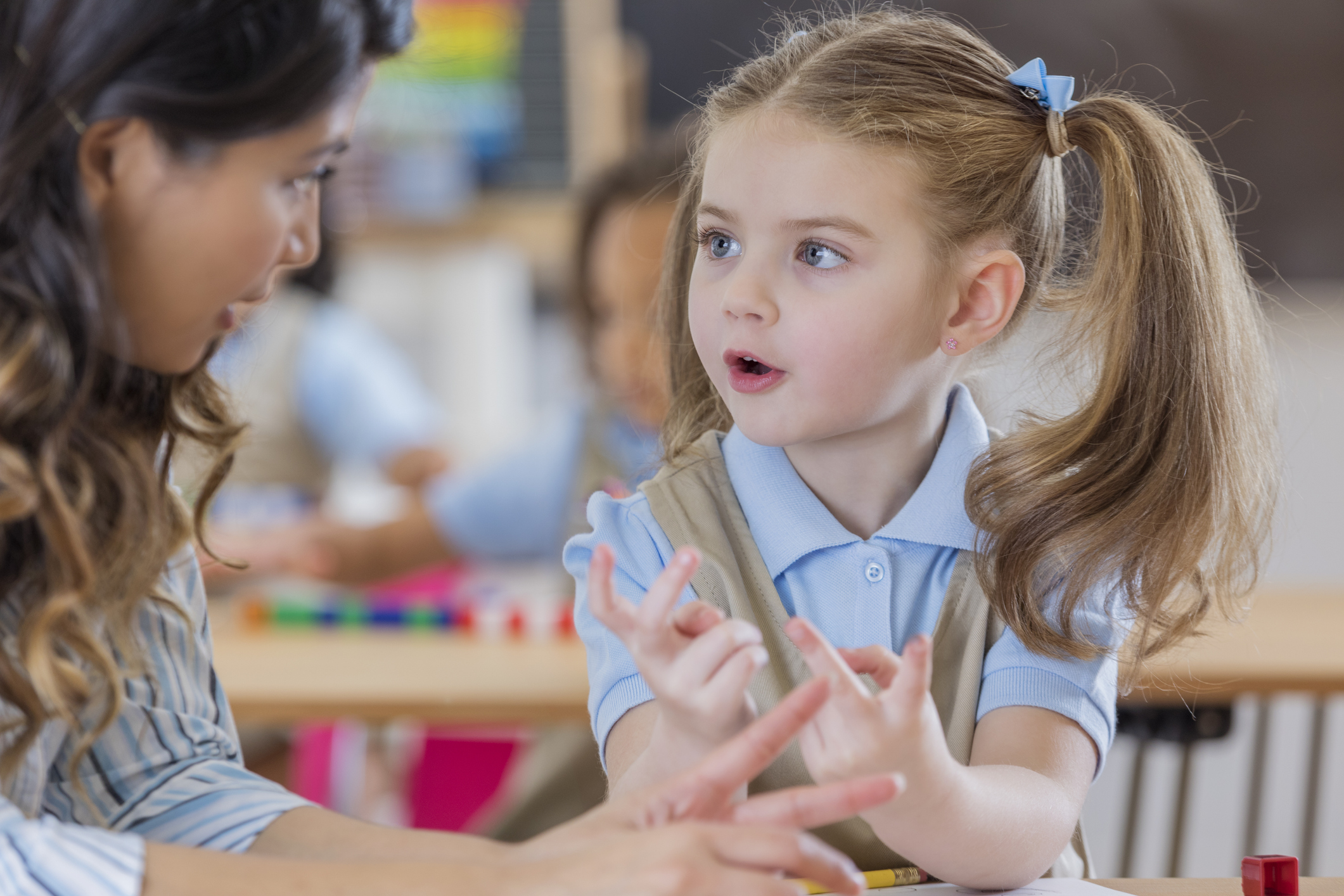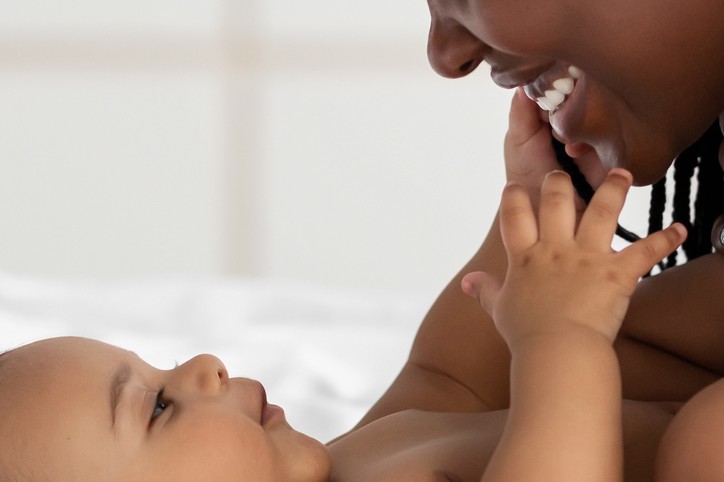It’s hard not to get caught up and become obsessed about milestones when you’re a parent. When I had my son I was worried about everything from how much he was eating (or not) when we started solids to how often (or not) he was rolling and driving myself crazy in the process. Talking with experts is the only thing that helped me relax, which is why I was so exiting to have the chance to interview Melissa Minney, the founder of Raising Little Talkers. Melissa created a positive approach through her 2-hour online program that moves beyond the age-old advice of “just talking to your child all day.”
Melissa offers real everyday solutions for families looking to create language-rich environments to encourage their toddler’s speech. Rather than focusing on talking non stop, Melissa says parents should focus on how to be more intentional with the language they’re modeling.
Raising Little Talkers’ Instagram page is full of encouraging tips and tools parents can use in their everyday routines and the real life testimonials on her program are truly incredible.
Keep reading for some of her amazing tips around speech development and related milestones.
Momtastic: What can parents do from day 1 to encourage speech development?
Melissa Minney: When I answer questions like this, I always like to remind parents that it’s okay to do nothing in those early months. It’s hard enough as it is figuring out feeding and sleep! When you’re feeling ready to think about speech and language development, a few of my favorites that don’t require much effort are: getting face to face with your baby, using “parentese”, and imitating. Getting face to face with your baby when you talk to them allows them to attend to your face and soak up all that good speech and language information and even develop social-emotional skills. To maximize that face to face time, research indicates using parentese, a high-pitch sing-song voice, is best to capture your baby’s attention. Written out it might look like “hiiiiii, maaamaaa’s here”. Lastly, imitation is a critical skill that develops before talking and luckily, babies are born with mirror neurons that allow them to mimic your facial expressions and even your voice. By imitating your baby’s sounds, you’re setting the stage for back and forth imitation which is an important way to connect and communicate with your baby early on. By doing all these things, your baby is preparing for understanding and using words down the road.

Momtastic: What are some not-so-obvious things parents might be doing that can impede speech development?
Melissa Minney: A common one I see a lot is parents telling their child to say words (e.g. “say ball!” while rolling a ball back and forth). When we want to hear our kids talk, it feels natural to tell them to say things, but for many toddlers, this pressure results in silence. If it works for your child, then that’s great, there is nothing inherently wrong with it. It’s when it’s not working (child shuts down or doesn’t respond) that I recommend trying a different approach. Instead, parents can model the words they’d like to hear (e.g., saying “ball!” with a big smile as they roll the ball back and forth) while having fun. Without the added pressure, toddlers will be more likely to imitate your language model.
Another thing parents do that can get in the way of talking is focusing too heavily on academic language. Parents are bombarded with the message from toy and app companies that their child will be more intelligent if they know colors, shapes, letters, and numbers, but in reality, heavily focusing on these things takes away from modeling functional words–words that can actually help your child communicate their wants and needs. That would mean modeling words like “go” “stop” “up” “down” while playing with cars instead of counting the cars and naming the colors.
Momtastic: Any special tips for babies in a household where each parent is speaking a different language to the child?
Melissa Minney: Firstly, I’d like to bust the myth that raising a child bilingual or multilingual causes speech and language delays–it doesn’t. Secondly, there is no right or wrong way to raise a multilingual child. Choose the method that feels right for your family. Some methods include:
- One Parent One Language is where each parent speaks to the child exclusively in a different language. The child is encouraged to respond in the language they’re spoken to. For example, mom speaks English, dad speaks Portuguese.
- Minority Language at Home is where the minority language is exclusively spoken at home by the family. This is a popular choice if the child will be getting exposure to the majority language in school and out in the community. For example, German is spoken exclusively at home and the child learns English in school.
- Context or Time & Place is where the family uses each language at different times depending on the day or situation. For example, bath time in Spanish & the rest of the bedtime routine is in English. Or speaking Spanish when at grandma’s house, but English the rest of the time.
- Mixing Languages is where the family switches between languages organically as they see fit. No plan is needed. For example, the parents switch between two languages depending on what they are doing or the context of the conversation.
- Some additional angles include enrolling in language classes or camps, spending time with fluent family/friends, hiring a nanny or au pair, enrolling in an immersion school in the target language, and watching movies and reading books in the target language

Momtastic: Is there a reason some children are more vocal than others in the first few months – is that because of genetics or environment?
Melissa Minney: Genetics, temperament, and environment can all play a role in how vocal a baby is. Some babies will be naturally quieter than others and some babies may be quieter as a result of their environment. An environmental example might be that the caregivers don’t talk as much around their baby. Overall though, most babies go through a typical progression of vocal development, which includes the following:
Cooing and gooing occurs around 2-3 months and includes sounds produced at the back of the throat. Social skill development starts at this age when coos coordinate with eye contact.
Vocal exploration occurs around 4-6 months and includes playful vocal noises like squealing, yelling, blowing raspberries, growling and some single consonant-vowel combinations like “da!” and “ba!”
Canonical babbling occurs around 7-9 months and includes repeated consonant-vowel combinations like ma-ma-ma-ma and ba-ba-ba-ba.
Variegated babbling occurs around 10-12 months and includes mixed consonants and vowels like ba-ga-da-ma.
Jargon is a type of variegated babbling that mimics adult conversation, but without words. Parents often say it sounds like “gibberish”. This typically occurs around 10-12 months, but some kids start this later when they’re on the cusp of using phrases and some kids skip this stage all together and go straight into word approximations, which I will explain next.
Word approximations typically occur between 10-12 months as well and include simplified versions of words like “ma” for “more”, “da” for “dog”, and “wawa” for water. These count as true words in your child’s vocabulary if they are used meaningfully, consistently, and independently (not mimicked).
You can see video examples of all of these here.
Momtastic: What are some of the major milestones that parents should watch out for and at what point should they seek help to make sure nothing is “wrong”?
Melissa Minney: There is a typical range for all skills to account for the natural variability that occurs among children. That being said, here are some red flags that would indicate a child is outside of the typical range. All of these warrant talking to the child’s pediatrician and getting an evaluation by a licensed speech-language pathologist:
- Difficulty making and maintaining eye contact with an adult by 6 months of age
- No big smiles or other warm, joyful expressions when interacting with an adult by 6 months
- No back and forth of sounds, smiles, or other facial expressions with an adult by 9 months
- No babbling by 10 months (I recommend getting hearing checked at this point, even if the child passed their newborn hearing screening)
- Not using meaningful gestures to communicate by 12 months (e.g., reaching arms up to be picked up, waving, clapping, reaching, showing, etc)
- Not responding to their name by 12 months
- Does not point to objects or show interest (like pointing out a plane flying overhead) by 14 months
- Does not follow simple and familiar directions by 18 months
- Less than 50 words at 24 months
- No 2-word meaningful phrases by 24 months
- No back and forth conversational turn-taking by 36 months
- Loss of babbling, speech, or social skills (like eye contact) at any age








